Cultural Safety, Legislation, and Indigenous Health Report
VerifiedAdded on 2020/12/29
|7
|1570
|51
Report
AI Summary
This report delves into the concept of cultural safety, emphasizing its significance for the Torres Strait Islander people. It examines the interplay of cultural awareness, competence, and safety, while also outlining relevant legislation like the Aboriginal and Torres Strait Islander Communities Act. The report highlights how diversity impacts service delivery and explores historical and current factors influencing Indigenous health and engagement with health services. It further explains the influence of Western systems on Aboriginal and Torres Strait Islander people's engagement with community services and delves into the factors contributing to ill health within these communities, including poor housing, sanitation, and unsafe water. Finally, the report proposes strategies for service providers to involve Aboriginal and/or Torres Strait Islander people in the planning and delivery of services and programs, promoting a holistic approach to healthcare.
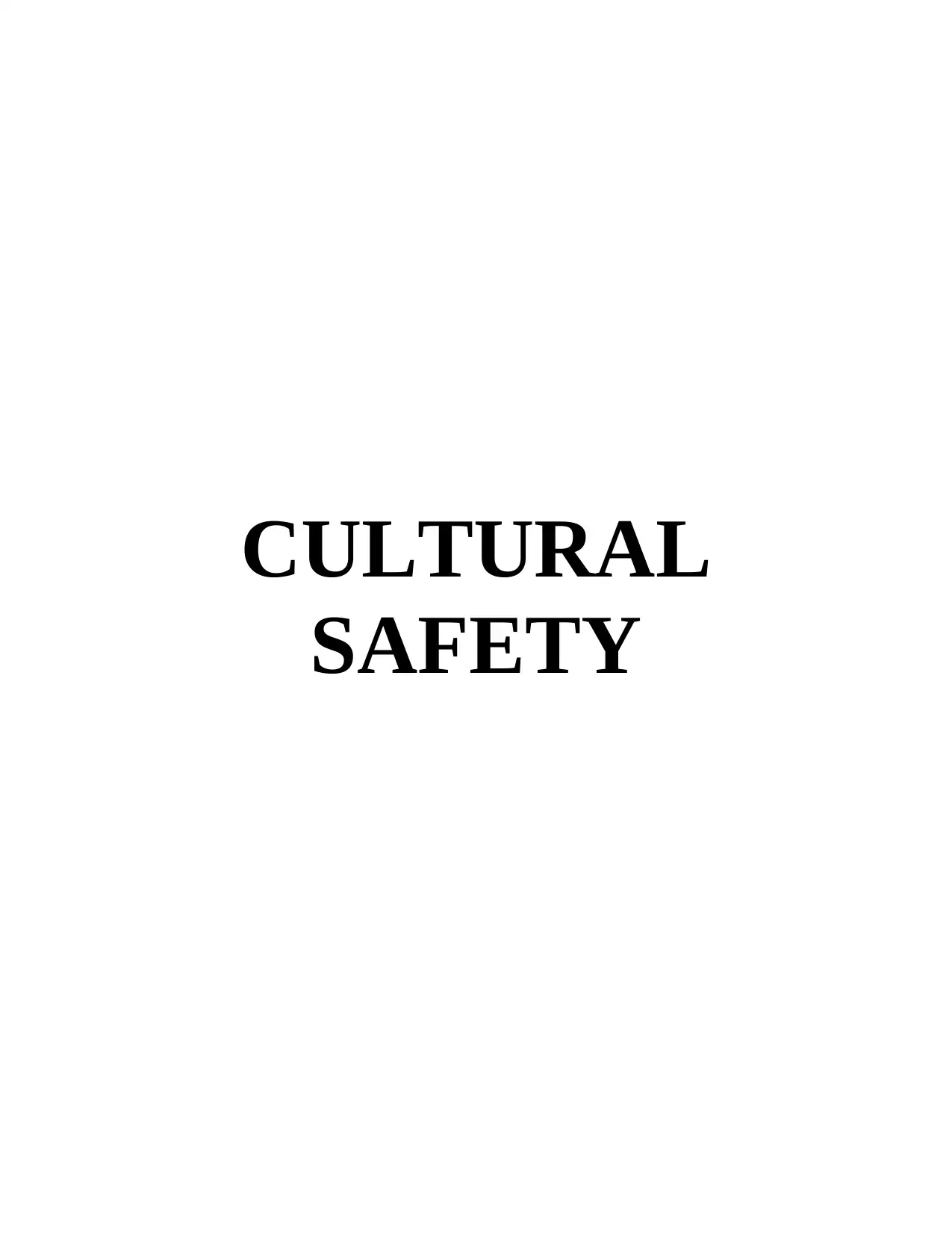
CULTURAL
SAFETY
SAFETY
Paraphrase This Document
Need a fresh take? Get an instant paraphrase of this document with our AI Paraphraser
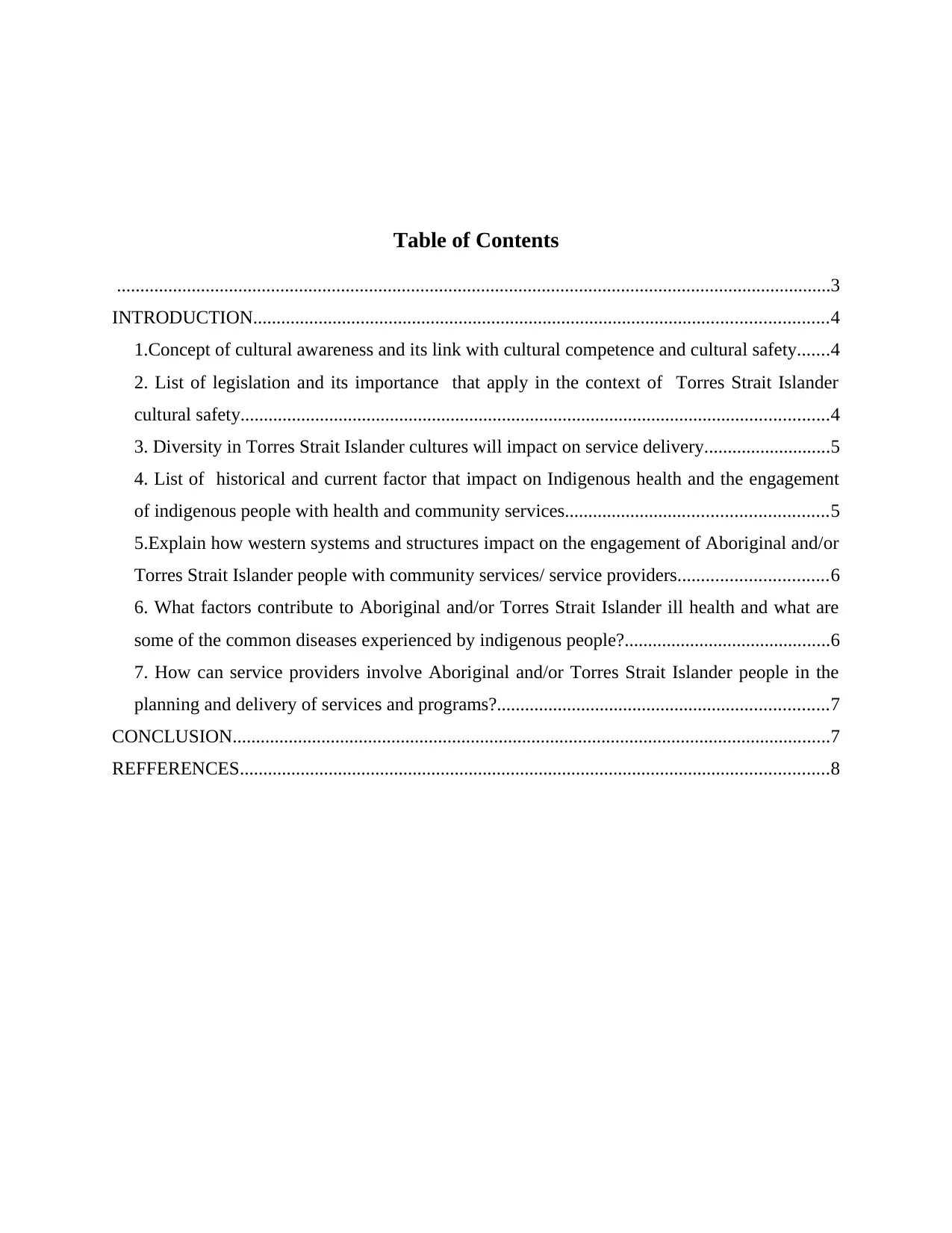
Table of Contents
.........................................................................................................................................................3
INTRODUCTION...........................................................................................................................4
1.Concept of cultural awareness and its link with cultural competence and cultural safety.......4
2. List of legislation and its importance that apply in the context of Torres Strait Islander
cultural safety..............................................................................................................................4
3. Diversity in Torres Strait Islander cultures will impact on service delivery...........................5
4. List of historical and current factor that impact on Indigenous health and the engagement
of indigenous people with health and community services........................................................5
5.Explain how western systems and structures impact on the engagement of Aboriginal and/or
Torres Strait Islander people with community services/ service providers................................6
6. What factors contribute to Aboriginal and/or Torres Strait Islander ill health and what are
some of the common diseases experienced by indigenous people?............................................6
7. How can service providers involve Aboriginal and/or Torres Strait Islander people in the
planning and delivery of services and programs?.......................................................................7
CONCLUSION................................................................................................................................7
REFFERENCES..............................................................................................................................8
.........................................................................................................................................................3
INTRODUCTION...........................................................................................................................4
1.Concept of cultural awareness and its link with cultural competence and cultural safety.......4
2. List of legislation and its importance that apply in the context of Torres Strait Islander
cultural safety..............................................................................................................................4
3. Diversity in Torres Strait Islander cultures will impact on service delivery...........................5
4. List of historical and current factor that impact on Indigenous health and the engagement
of indigenous people with health and community services........................................................5
5.Explain how western systems and structures impact on the engagement of Aboriginal and/or
Torres Strait Islander people with community services/ service providers................................6
6. What factors contribute to Aboriginal and/or Torres Strait Islander ill health and what are
some of the common diseases experienced by indigenous people?............................................6
7. How can service providers involve Aboriginal and/or Torres Strait Islander people in the
planning and delivery of services and programs?.......................................................................7
CONCLUSION................................................................................................................................7
REFFERENCES..............................................................................................................................8
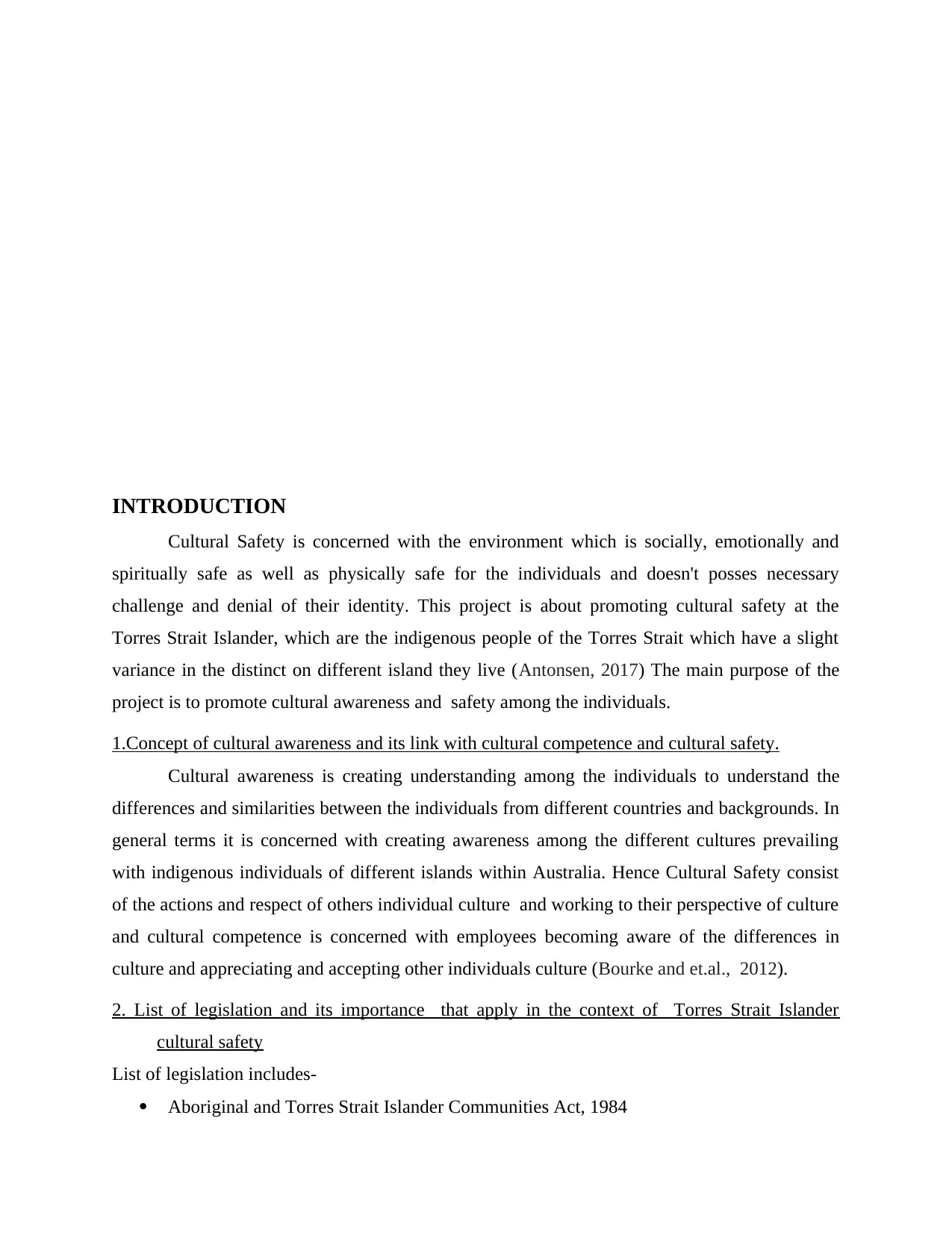
INTRODUCTION
Cultural Safety is concerned with the environment which is socially, emotionally and
spiritually safe as well as physically safe for the individuals and doesn't posses necessary
challenge and denial of their identity. This project is about promoting cultural safety at the
Torres Strait Islander, which are the indigenous people of the Torres Strait which have a slight
variance in the distinct on different island they live (Antonsen, 2017) The main purpose of the
project is to promote cultural awareness and safety among the individuals.
1.Concept of cultural awareness and its link with cultural competence and cultural safety.
Cultural awareness is creating understanding among the individuals to understand the
differences and similarities between the individuals from different countries and backgrounds. In
general terms it is concerned with creating awareness among the different cultures prevailing
with indigenous individuals of different islands within Australia. Hence Cultural Safety consist
of the actions and respect of others individual culture and working to their perspective of culture
and cultural competence is concerned with employees becoming aware of the differences in
culture and appreciating and accepting other individuals culture (Bourke and et.al., 2012).
2. List of legislation and its importance that apply in the context of Torres Strait Islander
cultural safety
List of legislation includes-
Aboriginal and Torres Strait Islander Communities Act, 1984
Cultural Safety is concerned with the environment which is socially, emotionally and
spiritually safe as well as physically safe for the individuals and doesn't posses necessary
challenge and denial of their identity. This project is about promoting cultural safety at the
Torres Strait Islander, which are the indigenous people of the Torres Strait which have a slight
variance in the distinct on different island they live (Antonsen, 2017) The main purpose of the
project is to promote cultural awareness and safety among the individuals.
1.Concept of cultural awareness and its link with cultural competence and cultural safety.
Cultural awareness is creating understanding among the individuals to understand the
differences and similarities between the individuals from different countries and backgrounds. In
general terms it is concerned with creating awareness among the different cultures prevailing
with indigenous individuals of different islands within Australia. Hence Cultural Safety consist
of the actions and respect of others individual culture and working to their perspective of culture
and cultural competence is concerned with employees becoming aware of the differences in
culture and appreciating and accepting other individuals culture (Bourke and et.al., 2012).
2. List of legislation and its importance that apply in the context of Torres Strait Islander
cultural safety
List of legislation includes-
Aboriginal and Torres Strait Islander Communities Act, 1984
⊘ This is a preview!⊘
Do you want full access?
Subscribe today to unlock all pages.

Trusted by 1+ million students worldwide
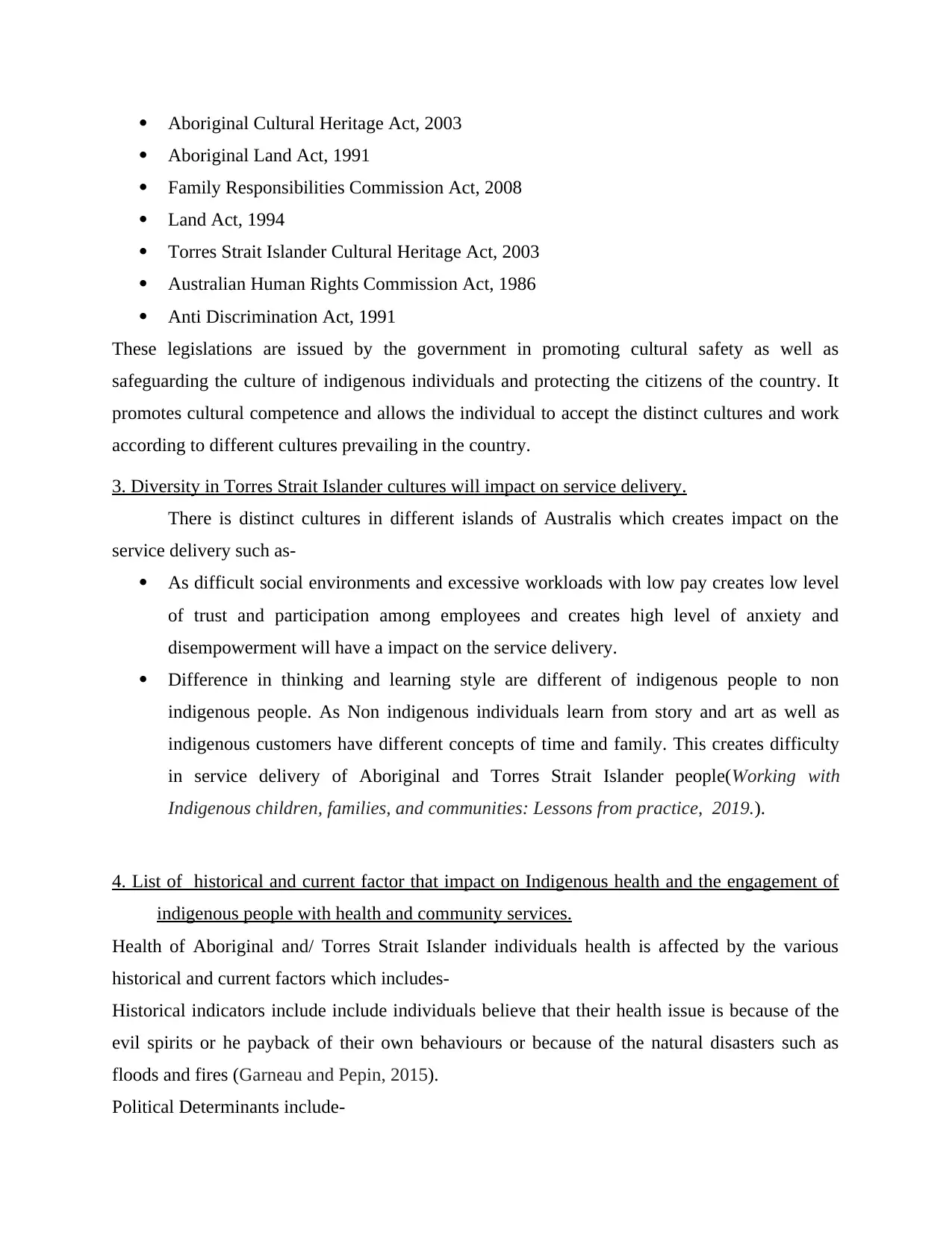
Aboriginal Cultural Heritage Act, 2003
Aboriginal Land Act, 1991
Family Responsibilities Commission Act, 2008
Land Act, 1994
Torres Strait Islander Cultural Heritage Act, 2003
Australian Human Rights Commission Act, 1986
Anti Discrimination Act, 1991
These legislations are issued by the government in promoting cultural safety as well as
safeguarding the culture of indigenous individuals and protecting the citizens of the country. It
promotes cultural competence and allows the individual to accept the distinct cultures and work
according to different cultures prevailing in the country.
3. Diversity in Torres Strait Islander cultures will impact on service delivery.
There is distinct cultures in different islands of Australis which creates impact on the
service delivery such as-
As difficult social environments and excessive workloads with low pay creates low level
of trust and participation among employees and creates high level of anxiety and
disempowerment will have a impact on the service delivery.
Difference in thinking and learning style are different of indigenous people to non
indigenous people. As Non indigenous individuals learn from story and art as well as
indigenous customers have different concepts of time and family. This creates difficulty
in service delivery of Aboriginal and Torres Strait Islander people(Working with
Indigenous children, families, and communities: Lessons from practice, 2019.).
4. List of historical and current factor that impact on Indigenous health and the engagement of
indigenous people with health and community services.
Health of Aboriginal and/ Torres Strait Islander individuals health is affected by the various
historical and current factors which includes-
Historical indicators include include individuals believe that their health issue is because of the
evil spirits or he payback of their own behaviours or because of the natural disasters such as
floods and fires (Garneau and Pepin, 2015).
Political Determinants include-
Aboriginal Land Act, 1991
Family Responsibilities Commission Act, 2008
Land Act, 1994
Torres Strait Islander Cultural Heritage Act, 2003
Australian Human Rights Commission Act, 1986
Anti Discrimination Act, 1991
These legislations are issued by the government in promoting cultural safety as well as
safeguarding the culture of indigenous individuals and protecting the citizens of the country. It
promotes cultural competence and allows the individual to accept the distinct cultures and work
according to different cultures prevailing in the country.
3. Diversity in Torres Strait Islander cultures will impact on service delivery.
There is distinct cultures in different islands of Australis which creates impact on the
service delivery such as-
As difficult social environments and excessive workloads with low pay creates low level
of trust and participation among employees and creates high level of anxiety and
disempowerment will have a impact on the service delivery.
Difference in thinking and learning style are different of indigenous people to non
indigenous people. As Non indigenous individuals learn from story and art as well as
indigenous customers have different concepts of time and family. This creates difficulty
in service delivery of Aboriginal and Torres Strait Islander people(Working with
Indigenous children, families, and communities: Lessons from practice, 2019.).
4. List of historical and current factor that impact on Indigenous health and the engagement of
indigenous people with health and community services.
Health of Aboriginal and/ Torres Strait Islander individuals health is affected by the various
historical and current factors which includes-
Historical indicators include include individuals believe that their health issue is because of the
evil spirits or he payback of their own behaviours or because of the natural disasters such as
floods and fires (Garneau and Pepin, 2015).
Political Determinants include-
Paraphrase This Document
Need a fresh take? Get an instant paraphrase of this document with our AI Paraphraser
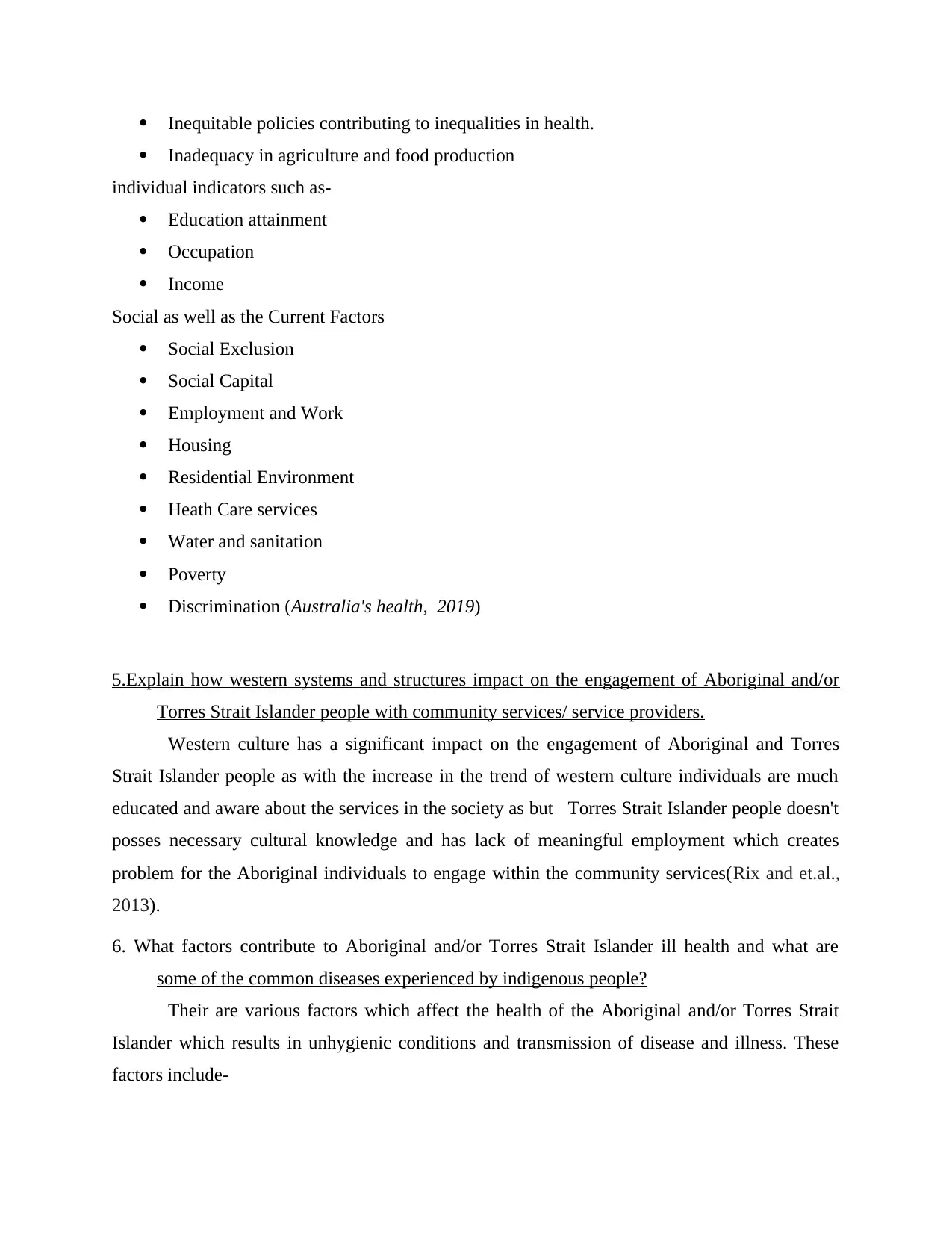
Inequitable policies contributing to inequalities in health.
Inadequacy in agriculture and food production
individual indicators such as-
Education attainment
Occupation
Income
Social as well as the Current Factors
Social Exclusion
Social Capital
Employment and Work
Housing
Residential Environment
Heath Care services
Water and sanitation
Poverty
Discrimination (Australia's health, 2019)
5.Explain how western systems and structures impact on the engagement of Aboriginal and/or
Torres Strait Islander people with community services/ service providers.
Western culture has a significant impact on the engagement of Aboriginal and Torres
Strait Islander people as with the increase in the trend of western culture individuals are much
educated and aware about the services in the society as but Torres Strait Islander people doesn't
posses necessary cultural knowledge and has lack of meaningful employment which creates
problem for the Aboriginal individuals to engage within the community services(Rix and et.al.,
2013).
6. What factors contribute to Aboriginal and/or Torres Strait Islander ill health and what are
some of the common diseases experienced by indigenous people?
Their are various factors which affect the health of the Aboriginal and/or Torres Strait
Islander which results in unhygienic conditions and transmission of disease and illness. These
factors include-
Inadequacy in agriculture and food production
individual indicators such as-
Education attainment
Occupation
Income
Social as well as the Current Factors
Social Exclusion
Social Capital
Employment and Work
Housing
Residential Environment
Heath Care services
Water and sanitation
Poverty
Discrimination (Australia's health, 2019)
5.Explain how western systems and structures impact on the engagement of Aboriginal and/or
Torres Strait Islander people with community services/ service providers.
Western culture has a significant impact on the engagement of Aboriginal and Torres
Strait Islander people as with the increase in the trend of western culture individuals are much
educated and aware about the services in the society as but Torres Strait Islander people doesn't
posses necessary cultural knowledge and has lack of meaningful employment which creates
problem for the Aboriginal individuals to engage within the community services(Rix and et.al.,
2013).
6. What factors contribute to Aboriginal and/or Torres Strait Islander ill health and what are
some of the common diseases experienced by indigenous people?
Their are various factors which affect the health of the Aboriginal and/or Torres Strait
Islander which results in unhygienic conditions and transmission of disease and illness. These
factors include-
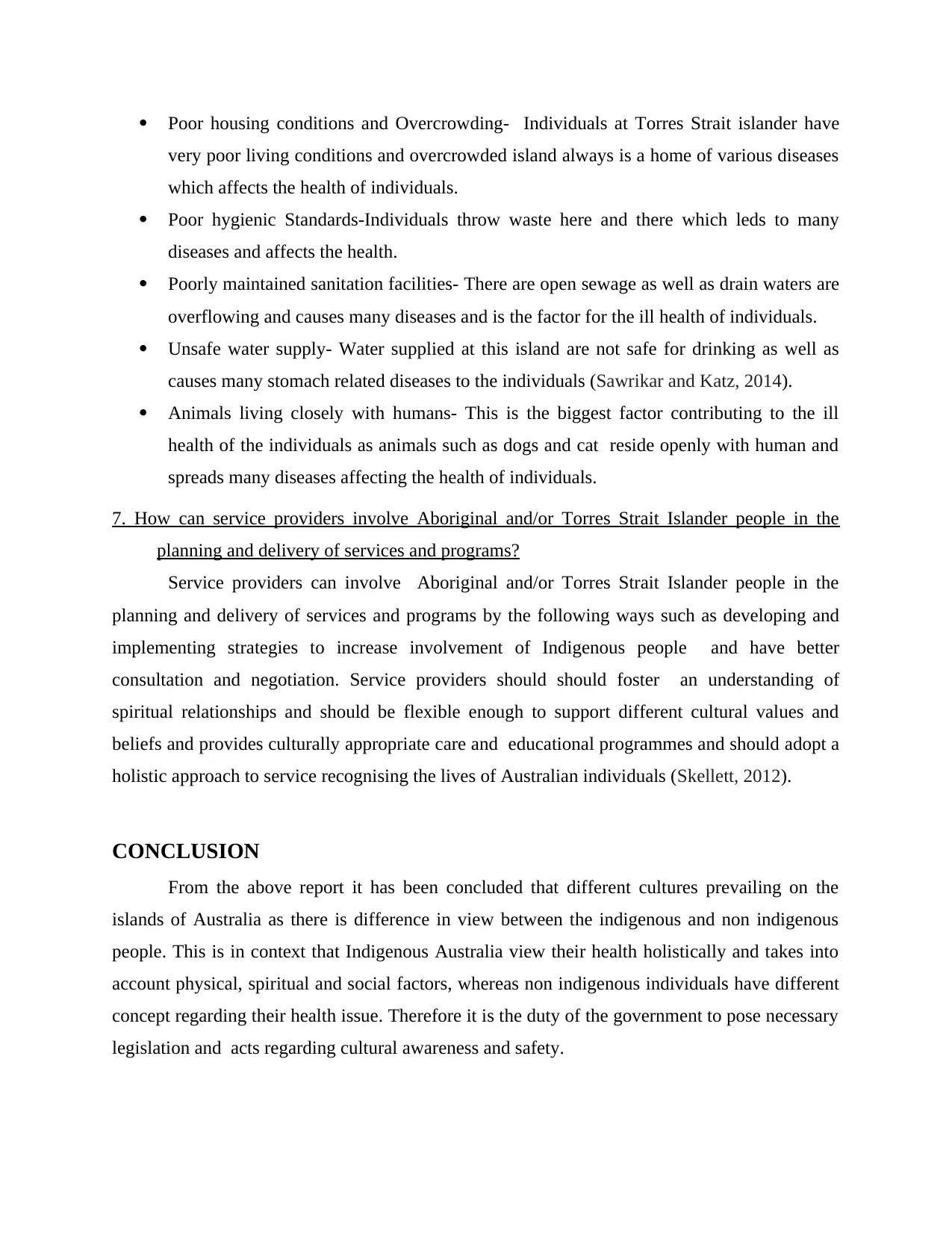
Poor housing conditions and Overcrowding- Individuals at Torres Strait islander have
very poor living conditions and overcrowded island always is a home of various diseases
which affects the health of individuals.
Poor hygienic Standards-Individuals throw waste here and there which leds to many
diseases and affects the health.
Poorly maintained sanitation facilities- There are open sewage as well as drain waters are
overflowing and causes many diseases and is the factor for the ill health of individuals.
Unsafe water supply- Water supplied at this island are not safe for drinking as well as
causes many stomach related diseases to the individuals (Sawrikar and Katz, 2014).
Animals living closely with humans- This is the biggest factor contributing to the ill
health of the individuals as animals such as dogs and cat reside openly with human and
spreads many diseases affecting the health of individuals.
7. How can service providers involve Aboriginal and/or Torres Strait Islander people in the
planning and delivery of services and programs?
Service providers can involve Aboriginal and/or Torres Strait Islander people in the
planning and delivery of services and programs by the following ways such as developing and
implementing strategies to increase involvement of Indigenous people and have better
consultation and negotiation. Service providers should should foster an understanding of
spiritual relationships and should be flexible enough to support different cultural values and
beliefs and provides culturally appropriate care and educational programmes and should adopt a
holistic approach to service recognising the lives of Australian individuals (Skellett, 2012).
CONCLUSION
From the above report it has been concluded that different cultures prevailing on the
islands of Australia as there is difference in view between the indigenous and non indigenous
people. This is in context that Indigenous Australia view their health holistically and takes into
account physical, spiritual and social factors, whereas non indigenous individuals have different
concept regarding their health issue. Therefore it is the duty of the government to pose necessary
legislation and acts regarding cultural awareness and safety.
very poor living conditions and overcrowded island always is a home of various diseases
which affects the health of individuals.
Poor hygienic Standards-Individuals throw waste here and there which leds to many
diseases and affects the health.
Poorly maintained sanitation facilities- There are open sewage as well as drain waters are
overflowing and causes many diseases and is the factor for the ill health of individuals.
Unsafe water supply- Water supplied at this island are not safe for drinking as well as
causes many stomach related diseases to the individuals (Sawrikar and Katz, 2014).
Animals living closely with humans- This is the biggest factor contributing to the ill
health of the individuals as animals such as dogs and cat reside openly with human and
spreads many diseases affecting the health of individuals.
7. How can service providers involve Aboriginal and/or Torres Strait Islander people in the
planning and delivery of services and programs?
Service providers can involve Aboriginal and/or Torres Strait Islander people in the
planning and delivery of services and programs by the following ways such as developing and
implementing strategies to increase involvement of Indigenous people and have better
consultation and negotiation. Service providers should should foster an understanding of
spiritual relationships and should be flexible enough to support different cultural values and
beliefs and provides culturally appropriate care and educational programmes and should adopt a
holistic approach to service recognising the lives of Australian individuals (Skellett, 2012).
CONCLUSION
From the above report it has been concluded that different cultures prevailing on the
islands of Australia as there is difference in view between the indigenous and non indigenous
people. This is in context that Indigenous Australia view their health holistically and takes into
account physical, spiritual and social factors, whereas non indigenous individuals have different
concept regarding their health issue. Therefore it is the duty of the government to pose necessary
legislation and acts regarding cultural awareness and safety.
⊘ This is a preview!⊘
Do you want full access?
Subscribe today to unlock all pages.

Trusted by 1+ million students worldwide
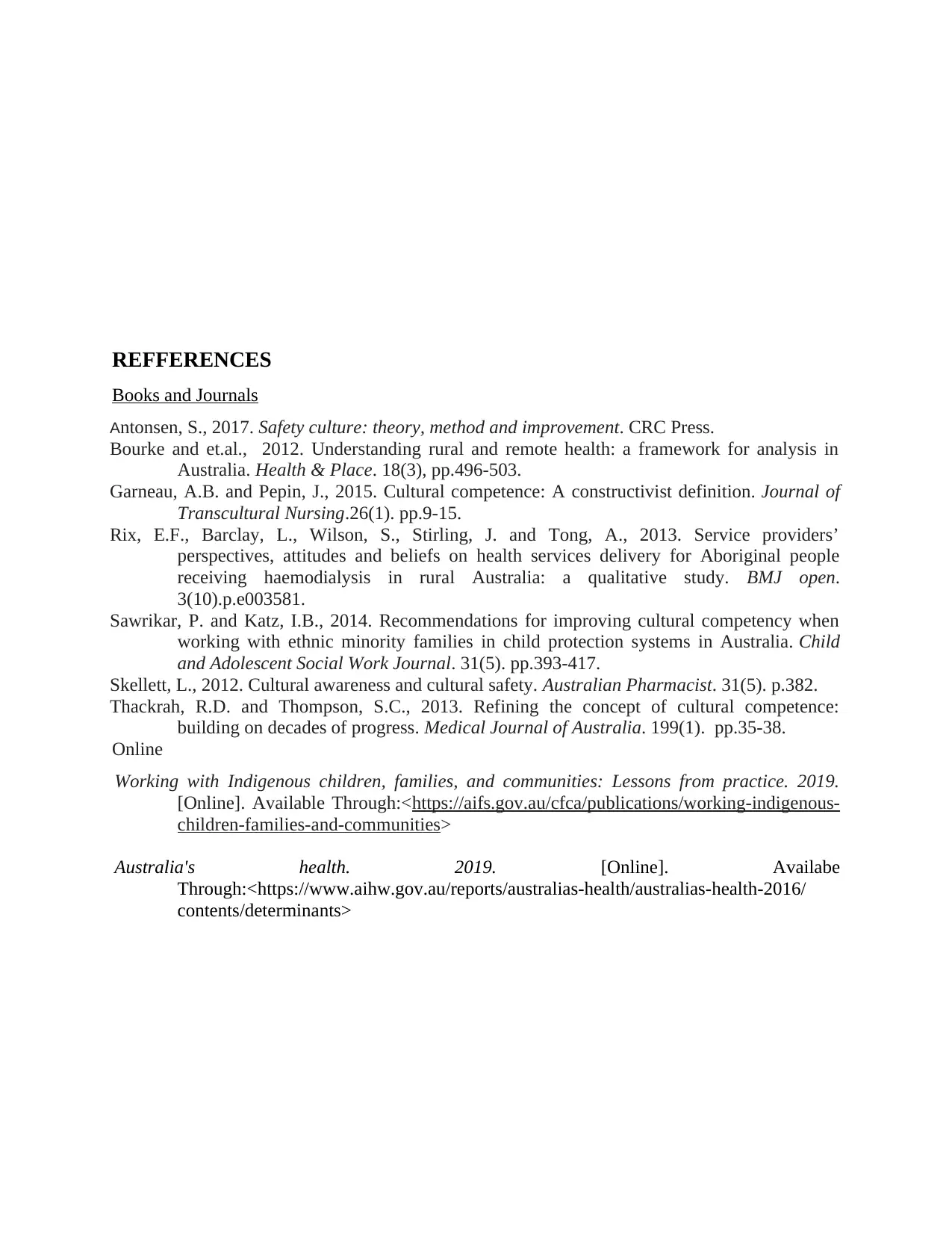
REFFERENCES
Books and Journals
Antonsen, S., 2017. Safety culture: theory, method and improvement. CRC Press.
Bourke and et.al., 2012. Understanding rural and remote health: a framework for analysis in
Australia. Health & Place. 18(3), pp.496-503.
Garneau, A.B. and Pepin, J., 2015. Cultural competence: A constructivist definition. Journal of
Transcultural Nursing.26(1). pp.9-15.
Rix, E.F., Barclay, L., Wilson, S., Stirling, J. and Tong, A., 2013. Service providers’
perspectives, attitudes and beliefs on health services delivery for Aboriginal people
receiving haemodialysis in rural Australia: a qualitative study. BMJ open.
3(10).p.e003581.
Sawrikar, P. and Katz, I.B., 2014. Recommendations for improving cultural competency when
working with ethnic minority families in child protection systems in Australia. Child
and Adolescent Social Work Journal. 31(5). pp.393-417.
Skellett, L., 2012. Cultural awareness and cultural safety. Australian Pharmacist. 31(5). p.382.
Thackrah, R.D. and Thompson, S.C., 2013. Refining the concept of cultural competence:
building on decades of progress. Medical Journal of Australia. 199(1). pp.35-38.
Online
Working with Indigenous children, families, and communities: Lessons from practice. 2019.
[Online]. Available Through:<https://aifs.gov.au/cfca/publications/working-indigenous-
children-families-and-communities>
Australia's health. 2019. [Online]. Availabe
Through:<https://www.aihw.gov.au/reports/australias-health/australias-health-2016/
contents/determinants>
Books and Journals
Antonsen, S., 2017. Safety culture: theory, method and improvement. CRC Press.
Bourke and et.al., 2012. Understanding rural and remote health: a framework for analysis in
Australia. Health & Place. 18(3), pp.496-503.
Garneau, A.B. and Pepin, J., 2015. Cultural competence: A constructivist definition. Journal of
Transcultural Nursing.26(1). pp.9-15.
Rix, E.F., Barclay, L., Wilson, S., Stirling, J. and Tong, A., 2013. Service providers’
perspectives, attitudes and beliefs on health services delivery for Aboriginal people
receiving haemodialysis in rural Australia: a qualitative study. BMJ open.
3(10).p.e003581.
Sawrikar, P. and Katz, I.B., 2014. Recommendations for improving cultural competency when
working with ethnic minority families in child protection systems in Australia. Child
and Adolescent Social Work Journal. 31(5). pp.393-417.
Skellett, L., 2012. Cultural awareness and cultural safety. Australian Pharmacist. 31(5). p.382.
Thackrah, R.D. and Thompson, S.C., 2013. Refining the concept of cultural competence:
building on decades of progress. Medical Journal of Australia. 199(1). pp.35-38.
Online
Working with Indigenous children, families, and communities: Lessons from practice. 2019.
[Online]. Available Through:<https://aifs.gov.au/cfca/publications/working-indigenous-
children-families-and-communities>
Australia's health. 2019. [Online]. Availabe
Through:<https://www.aihw.gov.au/reports/australias-health/australias-health-2016/
contents/determinants>
1 out of 7
Related Documents
Your All-in-One AI-Powered Toolkit for Academic Success.
+13062052269
info@desklib.com
Available 24*7 on WhatsApp / Email
![[object Object]](/_next/static/media/star-bottom.7253800d.svg)
Unlock your academic potential
Copyright © 2020–2026 A2Z Services. All Rights Reserved. Developed and managed by ZUCOL.




